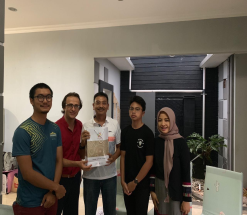This research aims to discover the main factor of parent involvement, whether it is parent visiting, and how to make the process work effectively. Where (Fan and Can, 2001) take parent involvement as one of the main categories. That is «Liaison with school staff». The author takes (Epstein, 2011 in Voorhis et al., 2013) class more productive and close to his idea. It is named as «School outreach to engage families». The definition of the first idea is home visits by the teacher to the parents. Nevertheless, the description of the second idea is outreach to engage families in any case and circumstances. The author focuses on this category as the main factor and indicates that «School outreach to engage families” is the main factor in involving families/parents to school. As a result, it is found out that the «school outreach process» can be organized by schools despite the financial or timing difficulty.
Keywords: school outreach, family engagement, liaison of staff.
- Introduction
The parent is a component in the family that includes father and mother and is a complete component. They are called father and mother because of the commitment of a legal marriage, so they can plan and build a family. The parents here play a role in caring for educating and supporting their children in education.
The parents' attention is the concentration of psychic energy focused on an object (Suryabrata, 2003). It means that the care of the parents concentrates on all individual activities shown to something or a group of objects, especially in education (learning process for their children). From this understanding, parents' attention can be interpreted as mental awareness to care for their children, especially in terms of providing and meeting the needs of children, both emotionally and materially, in the learning process (education).
Another interpretation supports the opinion that a surrogate parent is appointed to represent the interest of a child with a disability in the educational decision-making process. A surrogate parent is used only when no parents can be identified or when the school, after reasonable efforts, cannot locate the child's parent (Virginia Department, 2010: 6). It means that the parent is a more influential person for the student.
Parents have an essential role in shaping their children's personalities. Therefore, parents must involve the school learning process directly as parental involvement. Then, the guidance to the students cannot be done in one direction; parents and schools should have excellent communication. Conceptually, parental responsibility refers to a situation where parents are directly involved in the education of their children and commit themselves. They are also involved by the school and teachers in the learning process of their children and fulfill their duties as parents in making sure that the learners are assisted in the process of learning as much as they possibly can (Clinton & Hattie, 2013).
On the other hand, parental involvement has some correlations to school achievement with various variables, including parental aspirations and expectations for their children's education, communication with children about school-related matters, parental supervision, and parental participation in school activities (Fan and Can, 2001). There is also parental involvement in education showed by:
Encouraging parents into school
The schools have the activities to encourage parents to establish contact with the school. The schools used 'open days' when parents could visit the school to see classes in action. There are school performances' such as plays that involved many of the pupils. Moreover, 'new parents' evenings' when parents of newly enrolled pupils could look around the school and learn more about how the school functioned.
Acting as aresource
It means that the parents act as a resource for the schools' activities. Those included helping with sports coaching or sports events held at schools, involvement in cultural/musical or drama events, fund-raising, helping in the school library, supporting learning, taking part in working at school programs, mentoring pupils, helping on school camps, helping on class trips, working in the school canteen, and others.
Collaborating with teachers
It happens when the parents, through individuals, are communicated to the teacher (parent-teacher). The channels of communication could be by online media, written letters, book communication of students' achievement at school, meeting at school, and others. The activities help parents know about their children's activities and achievements at school.
Liaison with school staff
It can be done by home visits by the teacher to the parents. Through this activity, the schools can inform the condition of schools and students for creating the right circumstances for the teaching process.
Parent education. The parents' education can help schools have excellent communication with the parents about the condition of schools and students in the learning process (Hornby and Witte, 2010). Those parental involvements are related to positive parents-school relationships. It can make students get the best achievement at school because of the best circumstance between parents and school.
Furthermore, parental/family involvements are divided into four categories (Epstein, 2011 in Voorhis, et al., 2013):
– Learning activities at home.
– Family involvement at school.
– School's outreach program to engage families to school
– Supportive parenting activities.
Learning activities at home means that parents form the best learning atmosphere at home and accompany their children. Then, parents take the position as the mentor for their children for discussing the lessons. Meanwhile, family involvement at school refers to the actions and interactions of students' parents in the school area and activities. Furthermore, school outreach to engage families means that the strategies and practices used by the school and teachers to engage families/parents make them feel welcome at school and do school activities. It can say that parent engagement in schools is as parents and school staff working together to support and improve the learning, development, and health of children and adolescents (Centers for Disease Control and Prevention, 2012: 6)
Finally, supportive parenting activities include the nature and quality of the parent-children relationship and home environment, rule-setting, and caring behaviors. It is related to the relationships between parents and students at home and school, which is facilitated by the school with some programs.
Positive parent-children relationships present students the base foundation of learning. They can develop their skills for success in life with parents' sensitive, responsive, and predictable care. Parent-children relationships have powerful effects on children's emotional well-being (Dawson & Ashman, 2000), their necessary coping and problem-solving abilities, and their future capacity for relationships (Lerner et al., 2002). Through these relationships, children learn to engage with others and to succeed in different environments (Rogoff, 2003). It means that children (students) learn to be a new one in a new environment. They learn how to manage their emotions and behaviors with others, adjust to new situations, and resolve conflicts.
Parents can show how much they love to their children by always expressing attention to the children, which will create a lifelong intimate habit that benefits parents (Ramirez, 2006). In this condition, parents have warm, trusting, and reliable relationships with their children. Positive parent-children relationships will strengthen children's everyday learning activities and help them develop lifelong motivation, persistence, and love of learning (Dunst et al., 2006). For example, parents can participate with their children in reading a book.
Warm, sensitive, and responsive caregiving provides the foundation for healthy brain development and increases the odds for success in school (National Scientific Council on the Developing Child, 2004). It is related to children's intimate emotions with their parents. This condition can cause students to be able to learn lessons. It will make them get the best achievement at school. Emotions are intimately involved in virtually every aspect of the teaching and learning processes; therefore, an understanding of the nature of emotions within the school context is essential (Schutz and Lanehart, 2002). Emotions influence learning and achievement, mediated by attention, self-regulation, and motivation (Pekrun et al., 2005 in Zikuda et al., 2013). Parental involvement at school is related to positive parent-children relationships. That can make students get the best achievement at school because of intimate emotions between parents and students (emotional interaction).
- Method
This study uses qualitative methods, with the informants being students, parents, and the teacher and other school members. For collecting data, this research uses participatory observation, interviews, documentation, and study of documents — this research conducted between November 2019-January 2020 at Kesatuan Bangsa Bilingual Boarding School Yogyakarta.
- Result
The need for adequate guidelines, strategies, and techniques to involve parents in school is crucial and should be a priority of any administrator. If public school educators want parents to assume more responsibility, schools need to take proactive approaches that identify barriers to removing parental involvement (Smith et al., 2008). Numerous variables support student achievement; however, studies have indicated that parental involvement is one of the most critical components (Hara & Burke, 1998). Lai and Vadeboncoeur (2012) noted that schools have failed to engage parents fully. Taking this failure as an example, we found out a solution to engage parents fully. That is the same mistake that has been done for many years at schools, which is calling parents to school when there is a problem. That makes an adverse impact on parents and makes them very cold to school and school activities(involvement). So, what kind of actions should schools take? They should try to reach them outside the school. How can this become true? The main factor is «school outreach to engage families”. Schools should plan to visit parents. That is the only and the most effective way of reaching parents and engaging them at school.
We have observed one of the Indonesian boarding international schools (Kesatuan Bangsa Bilingual Boarding School). We had a chance to observe that the school uses «school outreach to engage families” method very effectively. As it is a boarding school, more than 65 % of the school population consists of students from far distanced cities from different islands. The school has an exceptional parent visiting program during the semester holidays. The school makes several groups that consist of male teachers who visit male students' parents and female teachers who visit female students' parents. Before they go visiting, school guidance and counseling give a seminar about how to deal with problems during the visit and parent visiting etiquette. If the teacher is a foreigner, one local teacher escorts, and if the teachers are both local, one must know the local culture and tradition of that place. Mostly, to educate, new and young teachers are chosen with experienced teachers. If there is an alumna in the place where they go, they can escort teachers either. If the school cannot reach parents who are too far away, they use another method we will mention, which is the purpose of this article. Scholars (Fan and Can, 2001) take parent involvement as one of the main categories by naming «Liaison with school staff». We have taken (Epstein, 2011 in Voorhis et al., 2013) category more effective. It is named as «School outreach to engage families». The difference is, in the first method, it indicates the parent visiting, but the second one indicates parent visiting either, additionally indicates in any case and circumstance. The school that we have observed uses the second method and finds out different solutions to visit parents. If we write the types, we can show the below features:
Teachers, especially homeroom teachers visit parents of school with group consists of at least two members in each.

Fig.1. Alumnae visits parents of the school

Fig.2. Old parents visit new parents of the school


Fig.3-4. Sister school teachers visit parents of the mentioned school
Of course, there are advantages and disadvantages to these methods. However, in education, any percentage of achievement can be taken as a benefit. Education is an ongoing process, and it is difficult to analyze according to one factor. Here, the main thing is the importance of reaching parents, which makes parents happy and satisfied. Because they know that it is difficult to reach them due to the geographic location, especially in Indonesia, this is the main difficulty of reaching and visiting. The disadvantage can be only the other visitors can not give as much information as the one who works in that school. To avoid this problem, the school tries to provide all the needed information about the child to the visitor.
Furthermore, the critical thing about parent visiting etiquette is giving presents to parents. School provides and sends unique souvenirs to parents with the school's logo on it. Also, cultural features is considered during the visit; that is why preferably the school sends teachers at least one who knows the culture of visiting the place.
- Conclusion
Research showed that the «school outreach program» is the primary and useful factor for engaging families/parents to school. «School outreach to engage families/parents» is done by visiting students' parents regularly to build communication about their children and school. By visiting the parents, the school gives information to parents about students' conditions at school. Then, parents feel that the school gives them attention because they are visited. It can motivate parents always to trust their children at school.
When the school member cannot come, the school asks one of the old parents to visit the new parents on behalf of the school. For example, other 12-grade parents visit 11-grade parents during the holiday on behalf of the school, as it is shown in the above photo. Parents visit in the family atmosphere can create a comfortable situation when parents talk about the condition of students and school. Parents will also share their experiences with school with each other. It will increase the confidence of parents to let their children stay at school. Besides, parents will know how to provide counseling and guidance to the students regarding learning in school.
Meanwhile, the school has another way for parents who live too far. The school (just done in 2019) asks alumna who lives in that specific city/place to visit the new parents on behalf of the school. The shared information about the school from alumnae can make parents believe in schools with all its advantages and disadvantages.
Regarding the explanation in the introduction above, school outreach to engage families can balance the permissiveness and controls to the student in the school setting. So, there must be good collaboration between school and parents to create the best condition for students. Then, by harmonious relationships, parents can know the students' (their children's) activities at school. We have some suggestions for schools which have not implemented this program and think it costs a lot. The schools can organize parent visiting those who live in the same city where the school is. Parents who live far, the school can ask old parents of the school to visit new parents, alumnae students who live in the same place or region.
References:
- Clinton, J. & Hattie, J. 2013. “New Zealand Students' Perceptions of Parental Involvement in Learning and Schooling”. Asia Pacific Journal of Education, 33 (3): 324- 337.
- National Scientific Council on the Developing Child. 2004. “Young Children Develop in an Environment of Relationships”. Working Paper No. 1. Retrieved from http://www.developingchild.harvard.edu./0895904812440501
- Centers for Disease Control and Prevention. 2012. Parent Engagement: Strategies for Involving Parents in School Health. Atlanta, GA: U. S. Department of Health and Human Services.
- Dawson, G., & Ashman, S. B. 2000. “On the Origins of a Vulnerability to Depression: The Influence of The Early Social Environment on The Development of Psychobio-Logical Systems Related to Risk for Affective Disorder” in The Effects of Adversity on Neurobehavioral Development. Minnesota Symposia on Child Psychology (Vol. 31: 245–278). Mahwah, NJ: Lawrence Erlbaum and Associates.
- Dunst, C. J., et al. 2006. “Everyday Activity Settings, Natural Learning Environments, and Early Intervention Practices”. Journal of Policy and Practice in Intellectual Disabilities, 3 (1): 3–10. experiences of mothers. Educational Policy, 29, 867–897. doi:10.1177
- Fan, X. and Chen, M. 2001. “Parental Involvement and Students’ Academic Achievement: A Meta-Analysis”. Educational Psychology Review, 13 (1): 1–22.
- Hara, S. R., & Burk, J. D. (1998). Parental involvement: The key to improve student achievement. School Community of Journal, 8(2), 219–228. Retrieved from http://moodle.cashlism.catholic.edu.au/pluginfile.php/11339/mod_resource/content/1/Parent %20Engagement.pdf
- Hornby, Garry and Crystal Witte. 2010. “Parental Involvement in Secondary School in New Zealand: Implications for School Psychology”. School Psychology International, 31 (5): 495–508.
- http://www.ruraleducator.net/archive/29–2/29–2_Smith.pdf
- Lai, Y., & Vadeboncoeur, J. A. (2012). The discourse of parent involvement in Lerner, R. M. et al. 2002. “Developmental Systems Perspective on Parenting” in M. H. Bornstein (Ed.), Handbook of Parenting(2nd ed.). Mahwah, NJ: Erlbaum.Rogoff, 2003)
- Pekrun, R. 2005. “Progress and Open Problems in Educational Emotion Research” in A. Efklides & S. Volet (Guest Eds.), Feelings and Emotions in The Learning Process. Special Issue. Learning and Instruction, Vol. 5.
- Ramirez Laura M. 2006. Mengasuh Anak Dengan Visi. Jakarta: PT Bhuana Ilmu Populer.
- school involvement. Rural Educator, 29(2), 8–13. Retrieved from Schutz, P. A., & Lanehart, S. L. 2002. “Introduction: Emotions in Education”.Educational Psychologist, 37(2): 67−68.
- Smith, J., Stern, K., & Shatrova, Z. (2008). Factors inhibiting Hispanic parent’s special education: A critical analysis linking policy documents to the Suryabrata, Sumadi. 2003. Psikologi Pendidikan. Jakarta: Raja Grafindo.
- Van Voorhis, Frances L. et al. 2013. The Impact of Family Involvement on the Education of Children Ages 3 to 8. A Focus on Literacy and Math Achievement Outcomes and Social-Emotional Skills. New York: MDRC Publication.
- Virginia Department. 2010. Synopsis of Psychiatry Behavioral Sciences/Clinical Psychiatry. Philadelphia (USA): Lippincott Williams & Wilkins.







